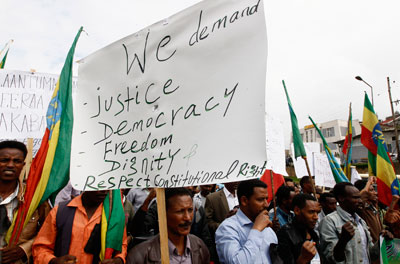“If they cannot indoctrinate you into their thinking, they fire you,” said one former staff member of the state-run Oromia Radio and Television Organization (ORTO), who was dismissed from work last month after six years of service. “Now we are in hiding since we fear they will find excuses to arrest us soon,” the journalist, who asked not to be identified for fear of reprisal, told CPJ.
On June 25, 20 journalists from the state broadcaster in Oromia, the largest state in terms of area and population in Ethiopia, were denied entry to their station’s headquarters, according to news reports. No letters of termination or explanations were presented, local journalists told CPJ; ORTO’s management simply said the dismissals were orders given by the government. “Apparently this has become common practice when firing state employees in connection with politics,” U.S.-based Ethiopian researcher Jawar Mohammed said in an email to CPJ. “The government seems to want to leave no documented trace.”
The journalists, some of whom had worked for the state broadcaster for over five years, can only speculate on the reason for their dismissals. Two of them told CPJ they believe it is linked to student protests earlier in the year.
On April 25, students at Ambo University, Oromia State, protested the government’s “Master Plan” to cede parts of Oromia State to the capital, Addis Ababa, a federal region, according to news reports. The state claimed in a statement that eight people died in violent protests in Ambo over a plan designed to provide urban services to rural areas. Oromo citizens say that many more died in Ambo at the hands of security forces for demonstrating against a proposal they fear will lead to the federal government grabbing their land and reducing local autonomy, news reports said. More student and civil society protests ensued soon after the Ambo University demonstrations and authorities were determined to quell any reporting on the unrest.
But the Oromo state broadcaster, listened to by millions of Oromo citizens, hardly covered the protests, according to local journalists. ORTO only discussed the protests after they had concluded, dismissing one of the region’s largest social actions as an illegal initiative conducted by violent elements, one journalist said.
Prior to the protests, however, TV Oromia aired a short segment where ruling party members criticized the plan to cede parts of Oromia State to the capital, local journalists told me. Many were surprised by the critical coverage coming from the state broadcaster, the same sources said. Senior members of Ethiopia’s ruling party may also have been surprised.
Last month, senior ruling party members such as former Communications Minister Bereket Simon and the pro-government Director of Fana Broadcasting, Waldu Yemasel, led an indoctrination program called “gimgama” (meaning “re-evaluation”) for the ORTO staff at the station’s headquarters in Adama, journalists who attended the program told me.
“The main purpose of the training was not to build the skill and profession of the journalists, but rather to identify the political positions of the staff,” said one of the journalists in attendance. The 180 staff members were divided into 12 groups with two ruling party cadres in charge of evaluating the staff within each respective group, the journalist told me. Some of the ORTO staffers suspect the government decided to rid the broadcaster of staff who sympathized with the protesters. The management told one source that the government was not pleased with them for not producing “developmental journalism,” a term local journalists define as “positive reporting on government projects.”
The fear of being imprisoned next is not unfounded. Ethiopia is the second worst jailer of journalists in Africa, trailing only Eritrea, with 17 journalists currently behind bars. They are all imprisoned on trumped-up charges or none at all, according to CPJ research. Under such conditions, local journalists told CPJ, many resort to fleeing the country to evade arrest. CPJ has assisted 41 Ethiopian journalists in exile since 2009.
New employees, Jawar said, now fill the 20 positions and it is business as usual at the state broadcaster. Following this purge, the Oromo–Ethiopia’s largest ethnic group with around 27 million people–will likely hear even less about civil society’s concerns in the future.
